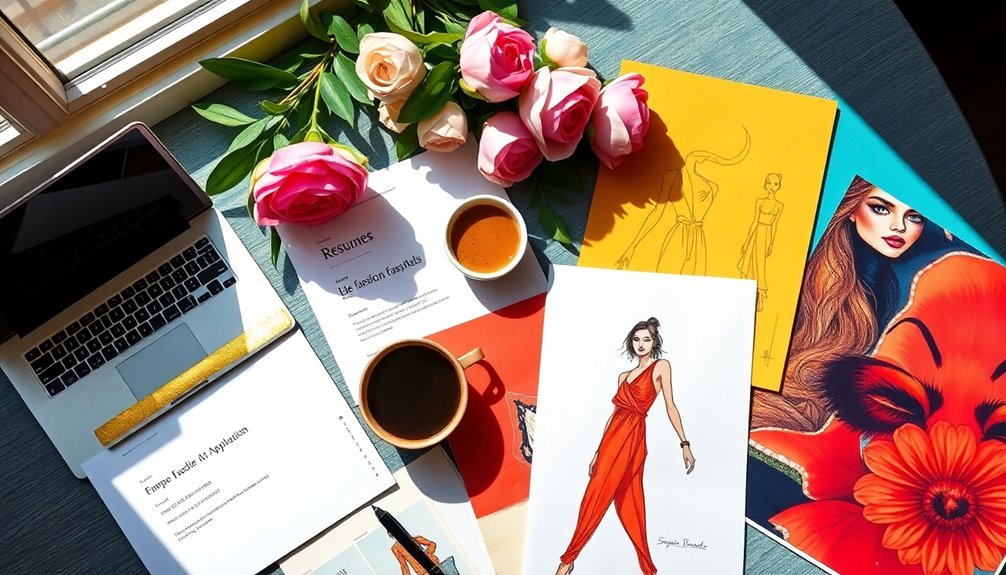This week, you've got some fantastic fashion job and internship opportunities to consider. Companies like Walmart and Victoria's Secret are offering paid internships that provide valuable experience and even housing benefits! If you're eager to hone your skills, internships at Carolina Herrera and David Yurman focus on analytics and trend research. You'll dive into design processes, event management, and market analysis. Remember to tailor your application to stand out. As you explore these options, there's so much more to uncover about securing a successful career in fashion. Don't miss out on the details that could elevate your journey!
Key Takeaways
- Walmart Fashion Design offers a paid internship in New York, providing housing benefits and key projects for interns.
- Victoria's Secret & Co provides a hybrid internship focusing on trend research and assistance to designers.
- The Carolina Herrera Fabrics Intern role involves managing a fabric library in a small company setting.
- David Yurman's merchandising internship emphasizes analytics and collaboration, with opportunities to present findings to senior management.
- Successful internships often lead to full-time job offers, with paid positions offering a higher success rate than unpaid ones.
Top Internship Opportunities
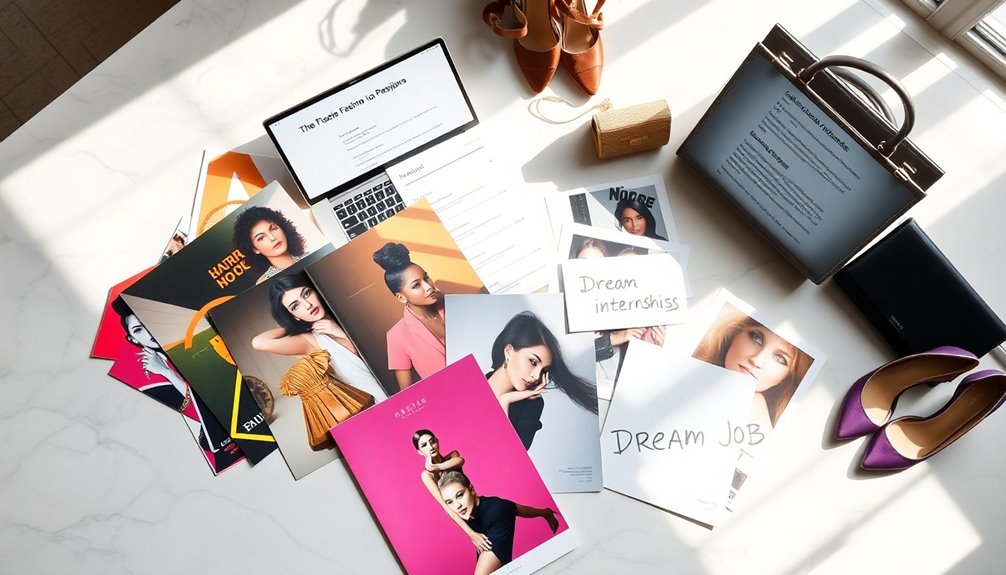
When it comes to landing a fashion internship, there are plenty of exciting opportunities waiting for you. For the summer of 2025, consider Walmart Fashion Design, where you'll dive into key projects and present to executive leadership—all while enjoying a paid internship with housing benefits in New York, NY. It's important to note that while unpaid internships are common in the fashion industry, this position offers a valuable exception.
If you're drawn to a major fashion brand, check out Victoria's Secret & Co., where you'll research trends and assist designers in a hybrid work setting.
If fabric is your passion, the Carolina Herrera Fabrics Intern position offers a small company vibe where you'll manage the fabric library and gain hands-on experience.
For a broader design role, the Fashion Design Intern position requires researching market trends and organizing showroom samples, so brush up on your Excel, Photoshop, and Illustrator skills.
On the merchandising side, consider the Internship in Merchandising with a focus on analytics, or the Buying Intern position at David Yurman, where you'll collaborate across departments and present your findings to senior management.
These internships provide invaluable experience and a foot in the door to the fashion industry. So, gear up and start applying! If you’re passionate about fashion and looking to gain hands-on experience, there are countless summer fashion internship opportunities available. These positions are highly competitive, so it’s important to start researching and applying early. Don’t miss out on the chance to jumpstart your career in the fashion world!
Featured Fashion Companies
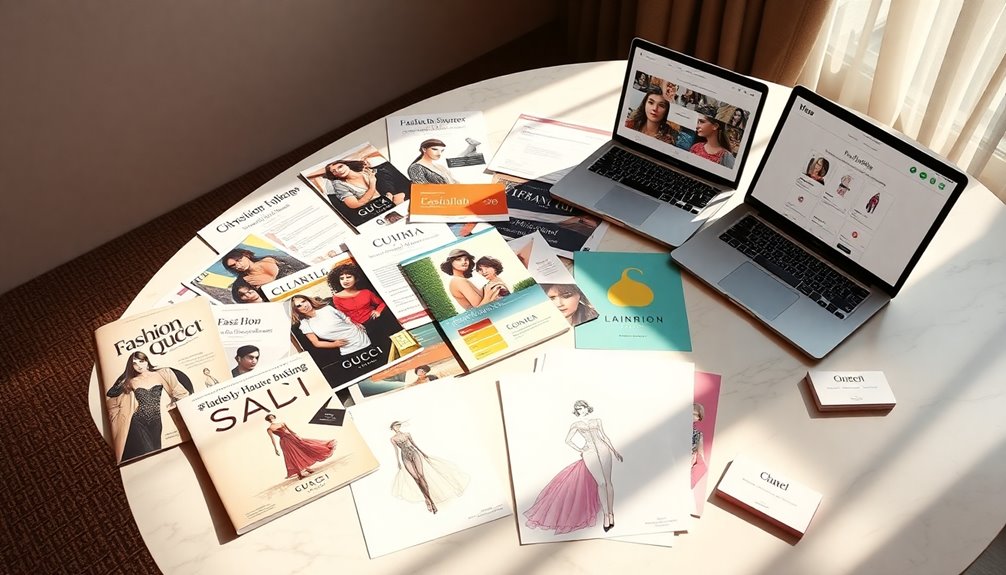
In the vibrant world of fashion, numerous companies stand out, each offering unique opportunities for aspiring professionals. Luxury brands like Versace and Dolce & Gabbana boast millions of followers, showcasing their powerful influence in the industry. With a significant online presence, Prada and Burberry also provide exciting prospects for those looking to break into high-end fashion. In fact, the combined following of luxury brands on social media exceeds 842 million followers, highlighting their global reach and impact.
For those interested in internships, iconic names like Ralph Lauren and Tom Ford offer valuable hands-on experience in luxury brand marketing and creative design. Companies like Jimmy Choo and Yves Saint Laurent are known for their high-end fashion, providing internships that can kickstart your career. If you're drawn to boutique settings, consider REGARD Style House or Love Shack Fancy, both offering specialized internships that focus on brand development and the unique demands of a boutique environment.
For a sustainable twist, brands like Everlane and Allbirds prioritize eco-friendly practices, making them ideal for those passionate about ethical fashion. Whether you're eyeing luxury, boutique, or sustainable brands, the fashion industry is brimming with opportunities to explore and develop your skills.
Key Responsibilities Overview
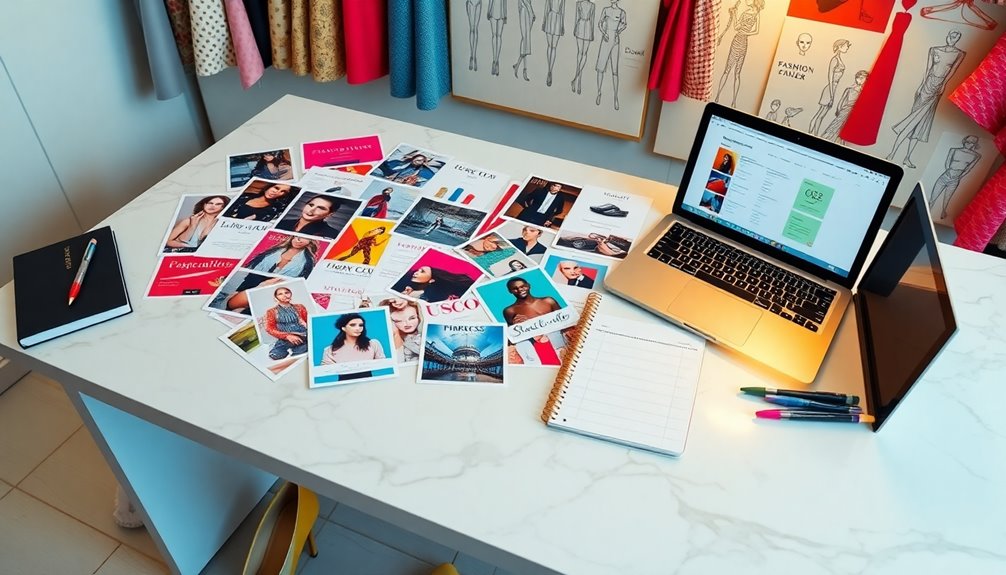
Fashion internships come with a variety of key responsibilities that can shape your career.
You'll dive into design and creative processes, researching trends to predict consumer preferences. Assisting in creating mood boards and sketching ideas will be crucial, as you'll bring your designs to life by selecting colors, fabrics, and materials. Cutting and sewing fabric, making patterns, and arranging showrooms will also be part of your hands-on experience. Additionally, understanding fashion trends will help you better forecast consumer preferences as you develop your designs.
Event and show management will require you to plan and arrange photo shoots, select models, and manage special events like product launches and fashion shows. You'll coordinate logistics to ensure every element aligns with the grand vision and help invite guests while corresponding with media and catering services.
On the administrative side, you'll handle tasks like replying to emails and managing social media accounts. Drafting press releases and maintaining organizational materials will keep you busy, alongside office maintenance.
Lastly, you'll manage wardrobe pieces, keeping everything neat and organized. Assisting in production, creating prototypes, and performing alterations will give you invaluable insights into the fashion industry.
Each responsibility prepares you for a successful career in fashion.
Required Skills for Success
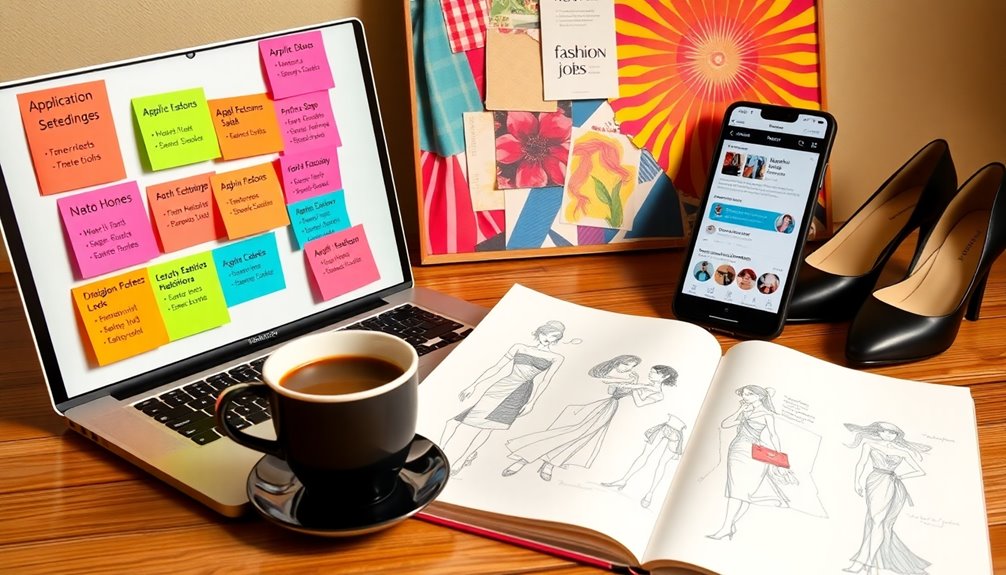
To thrive in the competitive fashion industry, you'll need a diverse skill set that blends creativity with analytical prowess.
First, your creative and technical skills are essential. This includes your artistic abilities, design and sketching skills, and a solid understanding of fabrics and materials. Mastering pattern making and garment construction, along with proficiency in CAD and design tools like Photoshop, InDesign, and Illustrator, will set you apart.
Moreover, analytical and strategic skills play a crucial role. You should be adept at analyzing sales data, conducting market research, and understanding consumer behavior. Strategic marketing planning, trend forecasting, and financial management are also vital for navigating the industry. Additionally, continuous learning is key to staying competitive and adapting to new industry trends.
Don't underestimate the importance of communication and leadership skills either. Being able to present your ideas clearly, manage teams, and build strong relationships will help you thrive.
Also, consider enhancing your digital and business skills. Knowledge of digital marketing, e-commerce platforms, and SEO writing is increasingly valuable.
Ultimately, a balanced combination of these skills will help you succeed and push your career forward in the dynamic world of fashion.
Internship Duration Insights
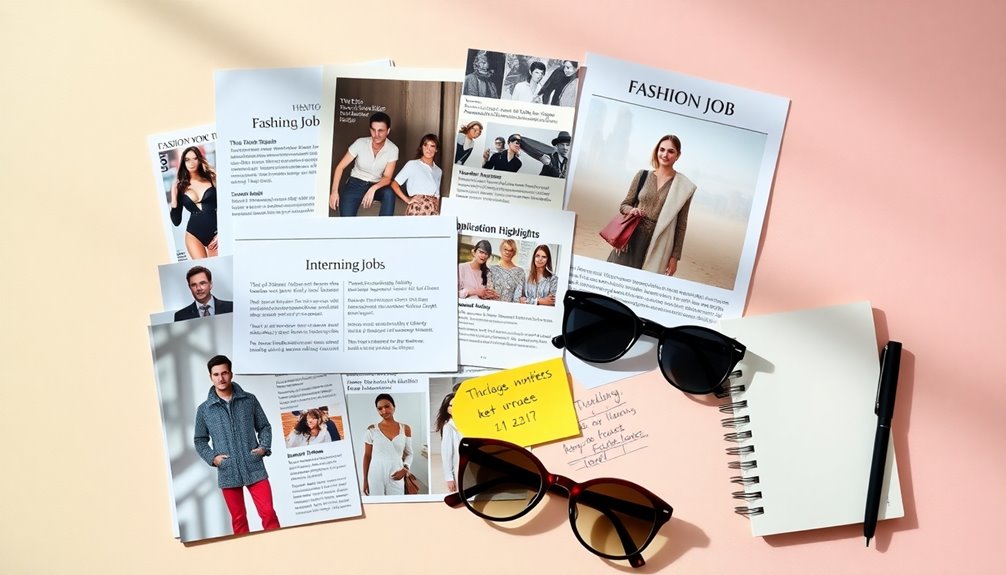
Internships in the fashion industry often vary significantly in duration, typically lasting anywhere from 3 weeks to 6 months. Short internships, like those around 1 month, usually focus on simple administrative tasks, while longer ones expose you to more substantial projects and responsibilities. Engaging in multiple short internships can provide diverse experiences that enhance your resume.
Summer internships often span 8 to 12 weeks, providing a solid experience during your break.
You can choose between part-time or full-time internships, which influences the tasks you'll handle. Part-time roles generally require 16 to 20 hours per week, allowing you to balance your academic commitments. In contrast, full-time internships often involve a 9-6 schedule, with the potential for weekend work, especially during busy periods like fashion week.
While short internships can be a good introduction, gaining around 6 months to 1 year of experience is often essential for landing a full-time job. Many fashion professionals complete multiple internships—typically 2 to 3—before securing a permanent position.
Full-time internships of 6 months can pave the way for assistant roles or promotions, enhancing your job prospects significantly.
Application Process Explained
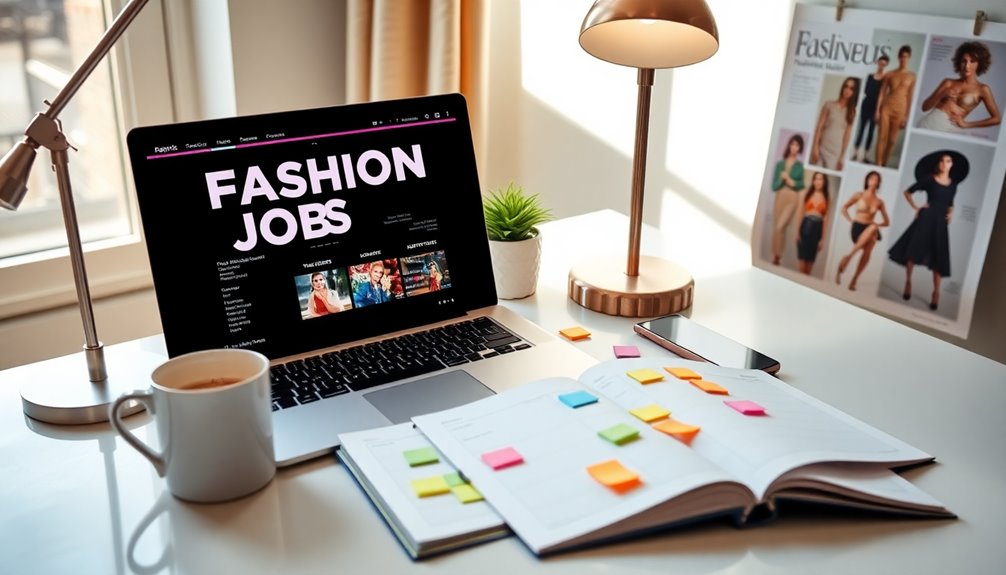
Navigating the application process for internships in the fashion industry can feel overwhelming, but breaking it down into manageable steps makes it much easier.
Start by identifying your department of interest, whether it's buying and merchandising, design, or public relations. Research companies and designers that excite you, diving deep into their internship programs.
Next, prepare your application materials. Create a comprehensive fashion portfolio showcasing your sketches, designs, and relevant projects. Write a personalized resume and cover letter tailored to each position, ensuring your materials are polished and professional. Utilizing fashion-specific job search websites can also streamline your search for internships.
Networking plays a crucial role too. Leverage school connections, attend career fairs, and volunteer for fashion events to meet industry professionals. Don't hesitate to reach out to your personal network for informational meetings.
When you're ready to submit your applications, do so early to increase your chances of being noticed. Research the company's history and values to tailor your application further.
Lastly, prepare for interviews by practicing common questions and following up with a thank-you note to reiterate your interest. By following these steps, you'll navigate the application process with confidence and clarity.
Eligibility Criteria Details
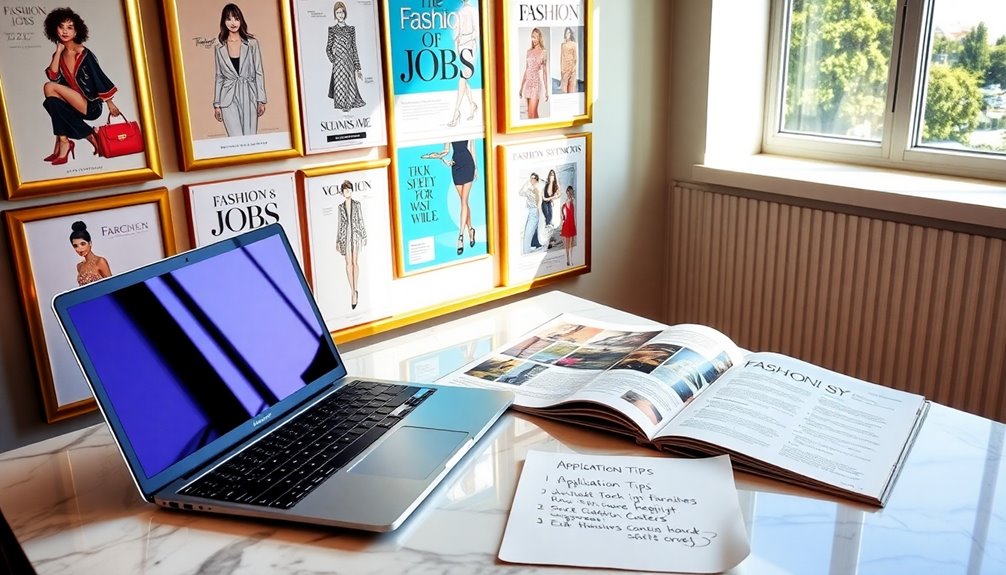
Understanding the eligibility criteria for fashion internships is essential for a successful application. To qualify, you need to complete at least 66% of your semester credit hours in Fashion Merchandising and a minimum of 24 resident credit hours from your institution, like Texas State. Overall, you should have at least 75 credit hours and complete specific courses such as English 1310 and 1320, Communications 1310, and Math 1315 or 1319, along with coursework related to your internship duties.
Your academic performance matters too. A minimum cumulative GPA of 2.25 is required across all areas, including your institution and major GPA. Some programs, like at Marist College, might ask for a GPA of 2.5 or higher. Additionally, you'll need the Internship Coordinator's permission and must complete an application and department approval form. Engaging with academic groups like the FM Career Connection Site is beneficial, and you should meet with the coordinator to discuss your goals and present your resume. This site serves as a resource for internship-related materials, providing updates and essential information to help you prepare effectively.
Finally, having a background in business or service can enhance your profile, along with strong communication and customer service skills.
Networking and Career Development
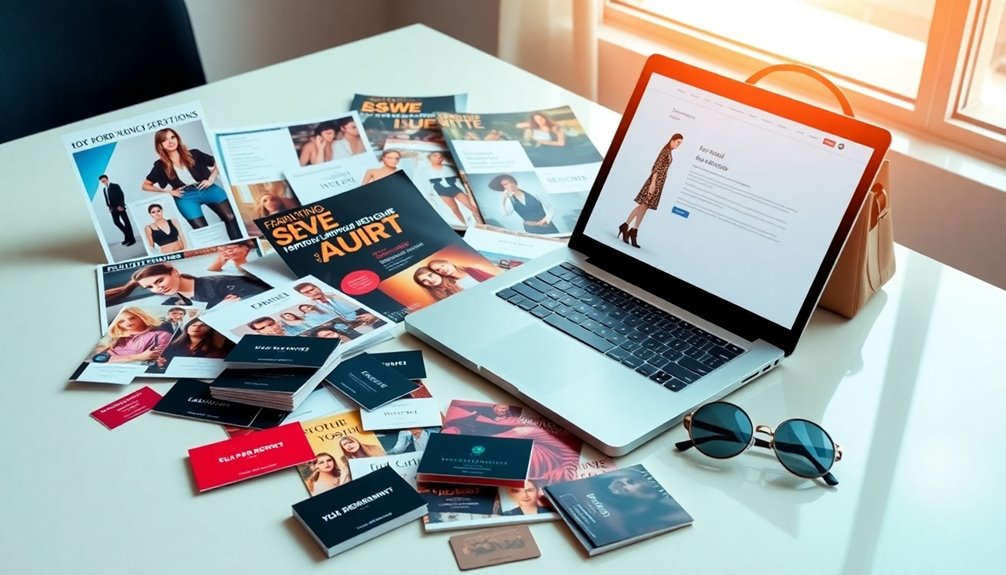
Networking plays a crucial role in advancing your career in the fashion industry. To build your network, attend fashion shows, workshops, and industry events where you can meet photographers, designers, and other professionals. Networking is essential for breaking into the competitive fashion industry.
Don't hesitate to contact fashion brands and retailers directly to inquire about work experience opportunities.
Utilizing social media platforms like Instagram, TikTok, LinkedIn, and Facebook can also help you connect with industry experts worldwide. Join fashion-related groups to interact with like-minded individuals and share your insights.
Creating genuine relationships is key. Stay in touch with your contacts, follow up after events, and show interest in their work. Engage in meaningful conversations by asking questions or giving compliments.
Attend events like runway shows to make lasting impressions and nurture these connections through consistent communication.
Leverage fashion events to meet new people and introduce yourself to industry insiders. Showcase your personality and professionalism while also engaging with brands and photographers online.
Paid vs. Unpaid Internships

Internships are a fundamental stepping stone for anyone aspiring to break into the fashion industry, but the distinction between paid and unpaid opportunities can greatly impact your career trajectory. Unpaid internships often exclude talented candidates who can't afford to work for free, disproportionately affecting low-income and working-class students. This not only limits access but also stifles diversity in the industry. Unpaid internships filter out candidates unable to work for free, further entrenching existing disparities.
Financially, unpaid interns face significant burdens; they may need to pay tuition for academic credits while delaying student loan repayments. In contrast, paid internships lead to full-time job offers 65% of the time, compared to just 39% for unpaid roles. Additionally, candidates who pursue niche selection in their internships often find themselves with more targeted opportunities and better outcomes.
Moreover, unpaid interns frequently perform demanding tasks without support, leaving them less equipped for future employment.
Regulatory frameworks are evolving, with many states and countries implementing laws for transparency and compensation. Employers should recognize the ethical implications of unpaid internships and reassess their ability to offer fair compensation.
While internships are essential for gaining experience, the choice between paid and unpaid can define your career path. Prioritizing paid opportunities can provide you with the financial stability and professional connections you need to succeed in the fashion world.
Recent Success Stories
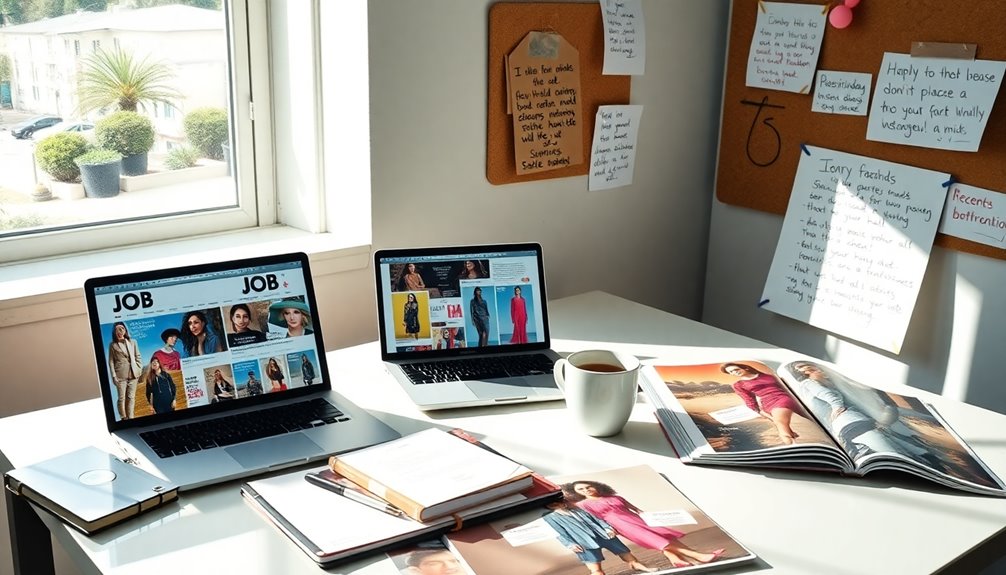
Recent success stories in the fashion industry highlight the incredible potential of passionate individuals who've taken bold steps to pursue their dreams.
Take Bianca Finch, for example; she began modeling at just 14 during New Orleans Fashion Week and quickly worked with renowned brands like Anastasia Beverly Hills and Vogue Mexico.
Victoria Henley transitioned from modeling to designing after placing in the top 5 on America's Next Top Model, showcasing her versatility in the industry. Notably, Henley modeled at NOLAFW in 2011 and 2012, which helped launch her career.
Anthony Ryan Auld made waves by competing on Project Runway, where he won fans over and later triumphed on Project Runway All Stars.
Similarly, Sandhya Garg, who won the Top Design Competition in New Orleans, has worked with fashion icons such as Alexander McQueen and Gucci, proving her unique talent.
Internships also play a crucial role in these success stories.
Emily Sanchez's journey from Harper's Bazaar to Vogue exemplifies how internships can pave the way for freelance opportunities.
Hannah Amini's determination led her to a dream internship in New York.
These stories inspire you to chase your own fashion ambitions and remind you that success is within reach.
Frequently Asked Questions
What Is the Typical Salary Range for Fashion Internships?
If you're considering a fashion internship, you can expect an average hourly salary between $20 and $22.
For instance, Abroad Internships offers around $20.45, while The Fashion Foundation pays about $20.30.
Annually, this translates to approximately $42,000.
Keep in mind that salaries can vary based on the company and your educational background, so it's smart to research specific opportunities to gauge potential earnings in this competitive field.
Can International Students Apply for These Internships?
Yes, international students can apply for internships, but there are specific requirements you'll need to meet.
You must have a valid visa and obtain a Foreigner Identification Number (NIE) if you're in Spain. Additionally, securing a Social Security Number is necessary.
Make sure you comply with local laws and prepare all required documents, like your enrollment certificate.
With the right preparation and guidance, you can successfully pursue these opportunities.
Are There Remote Internship Opportunities Available?
Yes, there are plenty of remote internship opportunities available in the fashion industry.
You can find roles in marketing, public relations, design, and more. Companies like Aria the Fox and Petite Studio often offer flexible positions that allow you to work with global teams.
These internships can help you gain valuable experience, develop skills, and even earn school credit or stipends.
Just tailor your resume and cover letter to stand out during the application process!
How Can I Make My Application Stand Out?
To make your application stand out, tailor your resume and cover letter for each position, highlighting relevant skills and experiences.
Use keywords from the job description and ensure your materials are polished and error-free.
Create a strong portfolio showcasing your best work.
Research the company to mention specific details that demonstrate genuine interest.
Finally, follow all application instructions closely and apply early to increase your visibility to hiring managers.
What Are the Chances of Receiving a Job Offer After an Internship?
Your chances of receiving a job offer after an internship are quite promising. In fact, about 66.4% of interns secure full-time positions post-internship.
If you've completed a paid internship, your odds increase significantly—up to 32% better than unpaid positions. Many firms prefer hiring interns they've already trained, making it crucial to excel during your internship.
Conclusion
In summary, this week's fashion job and internship highlights offer exciting opportunities for you to jumpstart your career. Whether you're applying to top companies or honing your skills, remember to leverage your network and stay informed about eligibility criteria. We've seen many success stories emerge, so don't hesitate to pursue paid or unpaid positions that align with your goals. Take the leap, and who knows? You might just land your dream role in the fashion industry!
